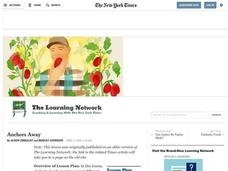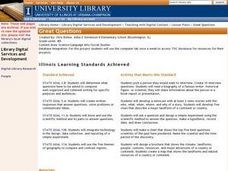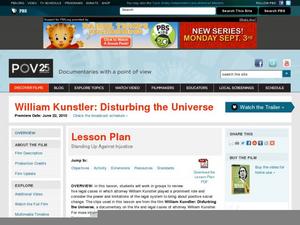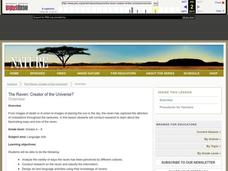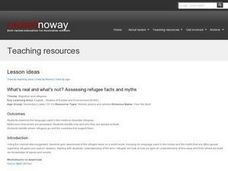Facing History and Ourselves
The Power of Images
One picture but a thousand stories. As a part of a case study of how the death of Michael Brown was reported by professional news sources and on social media class members examine the reactions of various groups to a photograph taken by...
Carolina K-12
World War II through the Radio Waves
Young historians channel the very medium used to convey news during World War I. They create and present a five-minute radio broadcast on a particular topic from the war, such as the roles of African Americans and women, war bonds,...
Facing History and Ourselves
#IfTheyGunnedMeDown
As part of their continued investigation of the reporting of the shooting of Michael Brown class members analyze photos of Michael Brown and the social media response to these images. The class then develops a guide they believe news...
Curated OER
Anchors Away
Students examine forms of broadcast journalism. they identify roles played by journalists in various news formats.
Rockefeller Archive Center
Understanding Mass Media News
In an age of fake news and photoshopped images, it is vital that 21st century learners development the skills they need to evaluate mass media and assess its validity. A great way to launch such a study is with a carefully crafted lesson...
Media Smarts
The Citizen Reporter
Ripped from the headlines! Discuss topical social issues like racism, discrimination, and diversity while exploring the concept of citizen journalism. Begin with a professional-looking presentation on the history of citizen journalism....
Pulitzer Center
Food Insecurity
Food insecurity, whether as a result of food scarcity or a lack of nutritious food, is a growing and serious problem in the world today. After discussing the concept of food insecurity, learners listen to an NPR radio broadcast on the...
Curated OER
Broadcasting the News Lesson 6
Students practice news reading at three words per second. They produce a news program while working as a team of reporters. They watch news clips of current reporters making a list of news reading tips. They play an online game that...
Curated OER
Our Savage Planet in the News
Students research volcanoes, storms, atmospheric conditions and extreme environments. They collect information and create a simulation of a science newscast. They watch a video and write a letter as an eyewitness to an avalanche.
Curated OER
Our Savage Planet in the News
Students research volcanoes, storms, atmospheric conditions, etc., find information and collect facts, create a simulation of a science news broadcast, watch a video clip of an avalanche, and create an artistic rendering of one naturally...
Curated OER
Create a Video Poem
Collaborate to create a visual version of a poem using video. Before class, choose a poem to pick apart. Read it aloud and then analyze it in detail as a class. Assign a line or short section to each student to expand upon using a...
Curated OER
Great Questions
Fourth graders research and create questions about a famous person. They create questions in a game format, create a computer generated brochure, and develop rubrics for their finished projects.
PBS
Standing Up Against Injustice
“Sometimes things are lawful yet are actually wrong.” Researchers examine primary and secondary source materials as they study five legal cases involving civil rights attorney William Kunstler in which he attempted to use the legal...
Curated OER
A Day in the Life
Students inquire about the politics and culture of Ancient Rome. In this Ancient Rome project/unit, students research life during ancient Roman times and create a newspaper with articles on politics, sports, culture, and economics.
Curated OER
I Want To Take A Picture In 1866!
Eighth graders examine the role of technology. In the Civil War lesson, 8th graders look at the advent of photography and determine the impact of photography on the Civil War.
Curated OER
Attention Seeking
Students compare the Ethiopia of the 1980's to today. In this current events lesson, students conduct research about the poverty-stricken Ethiopia exposed by the media in the 1980's with the conditions there today. Students discuss the...
Curated OER
The Raven: Creator of the Universe?
Students explore biology by researching birds in class. In this raven identification lesson, students utilize the Internet to identify the anatomy, habits and habitat of ravens. Students write descriptive paragraphs about ravens and read...
Curated OER
Henry Luce: Turn Me Luce
Students research the life of Henry Luce, Time Magazine's founder, and examine the impact his magazine has had on the way American's see the world. They create a photo-essay, magazine or video to present their research.
Curated OER
Casting a Wide Net
Students investigate topics that would be suitable for classroom podcasts. They read an online article, write and produce a podcast.
Curated OER
Reflecting On The Past, Looking Towaards The Future
Students engage in a lesson that is concerned with the formation of a multimedia presentation to create a documentary of a middle school. They take photographs with a digital camera and use computer software to create a school project.
Curated OER
What's Real And What's Not? Assessing Refugee Facts And Myths
Students examine language used in media to describe refugees, and identify how and why myths and misnomers are spread as facts.
Students then identify where refugees go and countries that support them.





